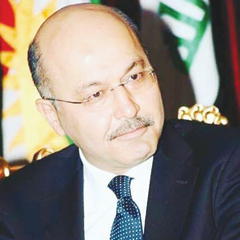Kuwait top priority is fate of missing citizens in Iraq: diplomat
 Iraqi President Barham Saleh
Iraqi President Barham SalehKUWAIT: President of Iraq Barham Saleh, accompanied by an official entourage, is due to begin an official visit to Kuwait today for holding official talks with His Highness the Amir Sheikh Sabah Al-Ahmad Al-Jaber Al-Sabah. This was announced by an Amiri Diwan statement yesterday. Earlier in Baghdad, Iraqi Presidency said in a statement that the president would begin a Gulf tour starting in Kuwait to discuss with leaders of the regional countries how to build "best relations" with Baghdad. The official Iraqi statement said that the president, during his talks with the Kuwaiti leaders, would discuss ways of boosting the bilateral relations, noting that his regional whirlwind will include the UAE. This regional mission is part of Iraq's efforts to build the best form of ties with the Gulf and Arab states, it said, in addition to setting up bases for good neighborliness, examining "economic and development integration."
Missing citizens
Meanwhile, a Kuwaiti senior diplomat underlined that unveiling fate of 369 Kuwaiti people missing in Iraq is on top of the Foreign Ministry's priorities. Nasser Al-Hayyen, Assistant Foreign Minister for International Organizations, made his remarks ahead of receiving part of Kuwait properties and national archive from Iraq, scheduled for Monday. He said the foreign ministry has been pressing Iraqi authorities to intensify efforts to determine fate of missing Kuwaitis. Iraq invaded Kuwait in 1990 and occupied the Gulf country for seven months before being ejected by an international coalition. During the occupation, Iraqi forces killed many Kuwaiti people and arrested hundreds others, as well as stealing public and private properties.
Deputy Prime Minister and Foreign Minister Sheikh Sabah Khaled Al-Hamad Al-Sabah and his Deputy Khaled Al-Jarallah always call upon Iraqi officials they meet to double efforts regarding the issue of missing Kuwaiti persons, said Hayyen. He added Iraq would hand over next Monday books, films, a painting and a sword. The Iraqi authorities had handed over in the past some properties found in Iraq, said Hayyen who commended the authorities in Baghdad for their cooperation.
The Iraqi government said Tuesday it would hand state TV and radio archives back to Kuwait, in line with relevant Security Council resolutions. Iraqi Foreign Ministry Undersecretary Hazem Al-Yousefi informed Kuwait's Ambassador in Baghdad, Salem Al-Zamanan, of the transfer, read a ministry statement. Baghdad took the move in the wake of its commitment to enhancing bilateral relations, mainly in political and economic domains, and to resolve all unresolved predicaments, the archive matter included. It comes "after efforts were exerted to search for and gather the Kuwaiti archives, in accordance with Security Council resolution 2107," ordered by Iraqi Foreign Minister Mohammad Al-Hakim, added the official. United Nations representatives will be in attendance during the hand over, he said.
Compensations
The United Nations Compensation Commission (UNCC) Governing Council had stated on Thursday that Iraq would pay, effective early next year, 1.5 percent worth of oil sales' proceeds to the UNCC compensations fund. The council said in a statement said this move would be in line with its resolution 276/2017 with respect of installments' payment in 2018. Kuwait, during inauguration of the current council session, expressed appreciation of the commission secretariat and its role in distributing repatriation installments. Chairman of Kuwait's Public Authority for Assessment of Compensation Resulting From Iraqi Aggression Khaled Al-Mudhaf stated that Kuwait received, earlier this year, three compensation installments, each valued at $90 million. The remaining sum that should be paid to Kuwait is approximately $4.4 billion. The UNCC was formed in 1991 as a United Nations Security Council body, with the aim of processing claims and paying compensation for losses and damage Kuwait suffered after it was invaded by its larger neighbor. - KUNA










